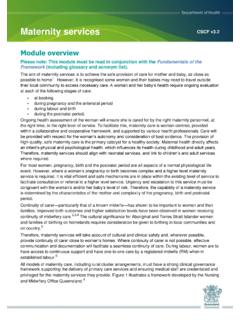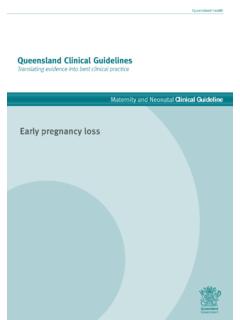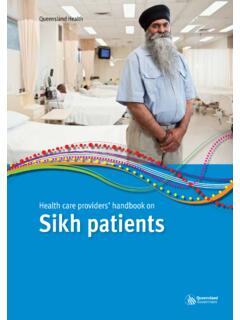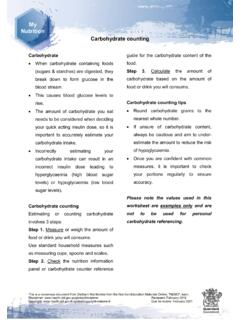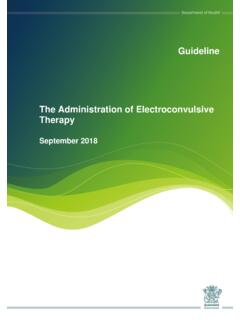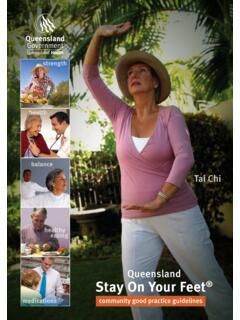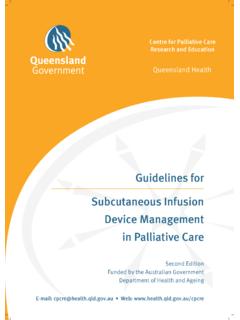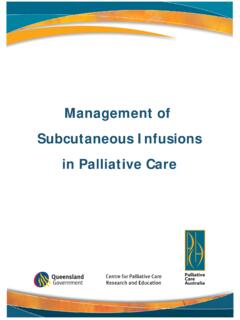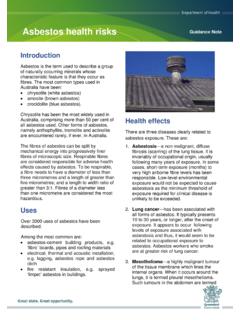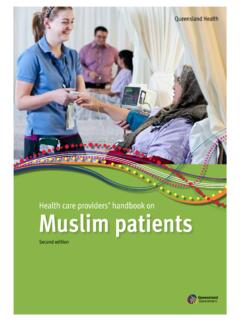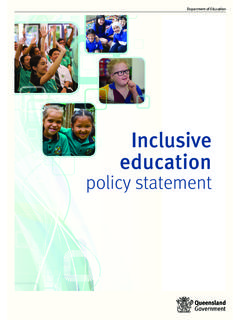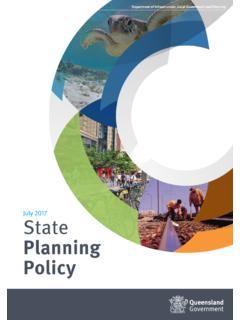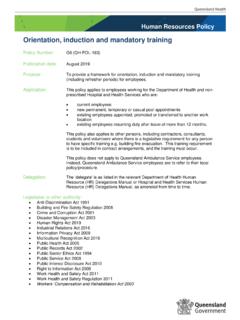Transcription of Queensland Health Five CCross CCultural Capabilities
1 Queensland Health Five Cross cultural Capabilities for clinical staff State of Queensland ( Queensland Health ) 2010. This document is licensed under a Creative Commons Attribution Non-Commercial Australia licence. To view a copy of this licence, visit You are free to copy, communicate and adapt the work for non-commercial purposes, as long as you attribute Queensland Health . For permissions beyond the scope of this licence contact: Intellectual Property Officer Queensland Health GPO Box 48. Brisbane Queensland 4001. email phone 07 3234 1479. Suggested citation: Queensland Health . Five Cross cultural Capabilities for clinical staff. Division of the Chief Health Officer, Queensland Health . Brisbane 2010. Five cross- cultural Capabilities : Collaboration for clinical staff Communication Context cultural You should be able to: gain trust and build understanding relationships with You should be able to: individuals across Self-reflection be sensitive and cultures responsive to varying work towards You should be able to: cultural norms in consider a range of consensus with relation to verbal and individuals and families You should be able to: social factors that may non-verbal impact on consumer from diverse gain a better communication backgrounds behaviour communicate understanding of understand the You should be able to.
2 Understand the impact effectively across culture', and potential importance of, and able consider what your own of migration and exile cultures cultural differences to involve culturally culture is and how you on individuals be sensitive to, and recognise power and linguistically consider the interplay overcome, potential feel about different relations that are diverse (CALD) clients cultural beliefs and of other individual barriers to effective produced in the Health in, decision-making values factors such as gender, cross cultural system, and exhibit processes sexuality, age and communication demonstrate a sound sensitivity to the impact conduct community socioeconomic contexts deliver information in understanding of of power differentials consultation and on identity culturally appropriate culture' on culturally and engagement understand that and targeted ways conduct a cultural self- diverse consumers work across disciplines individuals may not avoid making assessment to identify conduct a cultural identify with their own to provide appropriate your own culture, and assessment to determine assumptions or care culture.
3 And many judgements about position your cultural and accommodate skilled at facilitating individuals within individuals based on beliefs against that of different needs linkages including Australia consider their communication the Health system elicit different development of referral themselves bi- cultural ' style. conduct an assessment explanatory models and appreciate that pathways of the organisational respond appropriately individuals may have skilled at establishing and professional understand different more than one identity formal and informal cultures to which you consumer behaviours and identity is subject collaborative networks belong may be influenced by to change value and facilitate the identify and address culture avoid cultural exchange of personal and employ self-reflection determinism and information across organisational biases. to explore differences identify individual disciplinary boundaries. and similarities across needs.
4 Cultures. Cross- cultural capability one: self-reflection: understanding self'. Self-reflection can simply be thought of as self-awareness and it requires that you identify both your strengths and areas for growth, particularly in relation to working across cultures. This is the first step in achieving cultural capability and should be practiced across each of the cultural Capabilities outlined in the strategy. Before you can begin to have insight into diverse communities, individuals and groups, you need to understand and know your own culture and identity, whether this is your personal ethnic, spiritual or cultural heritage or your professional or organisational affiliations. Evidence has shown that our attitudes, whether we are conscious of them or not, have a direct and significant impact on the people around us1. Critical self- reflection involves being aware of your own culture and value systems to avoid biases or making assumptions about cultures or groups that are seemingly different from your own.
5 Through self-reflection, Health care providers are able to acknowledge their own cultural beliefs and values, including their beliefs about Health , which will allow them to make adjustments, where appropriate, to work competently and sensitively across cultures. Only a self-aware physician can completely understand his/her reactions to or expectations of a patient, judge the extent to which personally held biases might influence the situation and attempt to manage that bias2 (p. 535). Self-reflective practice avoids the common pitfall of ascribing difference' on to a cultural other'. Ethnocentrism is a term used to describe the imposition of your own cultural values and beliefs onto another individual culture. It occurs when a way of doing things, outside your own personal worldview, is deemed invalid and inferior, and your culture is seen as the standard or the norm. Stereotyping occurs when different cultural groups are reduced to a set of core characteristics and seen as a type' devoid of a range of unique personal characteristics.
6 It is important to remember that stereotypes can be positive or negative and stereotypes are, in themselves, neither true nor false. Indeed some individuals do fit stereotypes. Steve Irwin, for example, in many characteristics conformed to stereotypes of Australian identity. Stereotypes, on the whole, overlook the complexity of individuals, and the individuality within groups. Self-reflective practitioners are able to think about the strangeness' of their own cultural norms and practices before labelling a culture or way of doing things different from their own as strange or radically different. In doing so, they avoid exoticism the tendency to view different cultures as inherently mysterious and incompatible with their own. Exoticism also often involves romanticising different cultures or seeing a different culture as inherently benign or simplistic. In practice, the consequences of self-reflection would allow individuals to avoid making conclusions about difference and value judgements about behaviours or actions.
7 Self-reflection allows staff to reflect on their own cultural background and preferences and to also illuminate shared practices across cultures. It also allows individuals to query their own assumptions and bridge divides or barriers between cultural groups. 1. Self-reflection is a competency specification of the Australian Government's cultural Competency in Health : A Guideline for policy , Partnerships and Participation 3. It is also the first competency employed by a number of Health services, including New South Wales Health Department (South-East Illawara Area Health Services and Eastern Sydney Multicultural Unit). It is included in training modules delivered by the Victorian Centre for Ethnicity and Health and Judith Miralles and Consultants, and in many international cultural competency modules such as Health Canada and the United States. The Victorian Department of Human Services' Aboriginal and Torres Strait Islander cultural Competence Framework also include self-reflection as a critical first step in developing cross- cultural skills.
8 Self-reflection has long been central to nursing practice but has also been established as a starting point for cross- cultural work more generally, across disciplines. Self-reflection is the starting point for cultural capability. It is an established foundation of many disciplines and considered best practice in the field of cross- cultural work. Self-reflection should be integrated into all cultural competency training. Self-reflection starts by providing tools for developing a sophisticated framework for thinking about intercultural communication and engagement. It may then be practiced situationally, or as the need arises. Self-reflection increases individual cultural awareness knowledge and skills. Examples of self-reflective practice in other training materials and in a Health context How to reflect on your own culture: Think about a time when you were with a group of people from another country, or even another part of Australia.
9 What were the similarities and differences in culture? What would you describe as your culture? How would you rank the following in order of importance: ethnicity, family, work, the future, diet and religion? Do you believe that your clients have the same priorities? Consider the list of areas where cultural variations in beliefs and values frequently occur. Can you immediately determine your preferences? What about the preferences of a friend or current client? Would the choices you make in your role as a XX be different from those for yourself or someone you care about? Do you believe it is appropriate to discuss Health issues with a client's family and friends? Why? What about discussing Health issues such as menstruation, pregnancy and sexually transmitted disease with members of the opposite sex? What does your body language say about you? How might a client from another culture interpret your posture, eye contact and the tone of your voice?
10 Could your body language be communicating something different from your words? As an individual, how do you value personal independence, family, freedom, meaningful work, spirituality, etc? How does this have an impact on your relationships with clients? Continually reflecting on your reactions to your and your clients' cultures will assist you in providing culturally capable care4. 2. Questions to develop self-reflective practice What client behaviours or practices make me feel uncomfortable? How do I respond when I am frustrated? What are my biases and prejudices? What keeps me from understanding or putting myself in others shoes? Do I believe other beliefs are valid? When I judge others, what am I feeling? Do I reflect on my status and how this might affect communication and interaction with others? How do I feel when others make judgements or statements about me on the basis of my race, culture, ethnicity, gender or sexuality?
